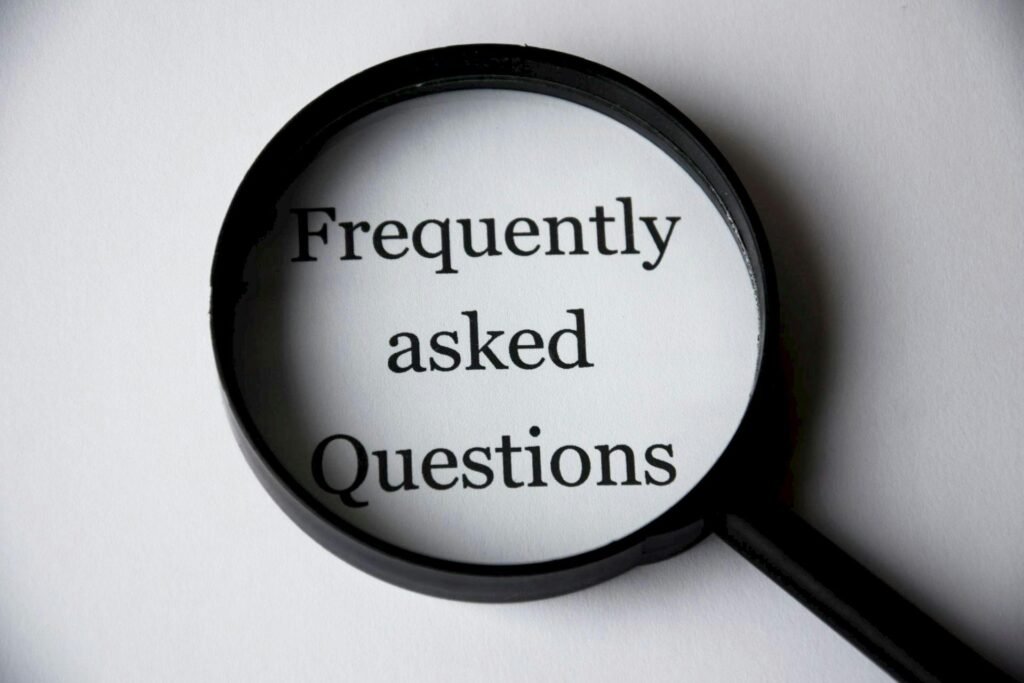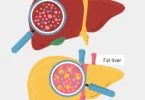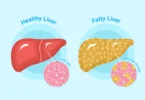If you are dealing with weight gain and have experienced more fatigue than usual, your liver may be sending you a signal. Fatty liver disease is common globally, and its relationship with your weight changes can create a cycle that is challenging for many people to understand fully. The truth is fatty liver disease and weight gain are interconnected. Each condition can initiate and exacerbate the other, forming a health puzzle that is worth paying attention to and caring about.
You are not alone in this process. The important part is understanding how your body reacts to these changes, which will enable you to move in the direction of better health productively, one decision at a time.
What Is Fatty Liver Disease?
Fatty liver disease occurs when excess fat accumulates in your liver cells and interferes with its functioning. There are two primary types: non-alcoholic fatty liver disease (NAFLD) and alcoholic fatty liver disease. With the increasing prevalence of obesity and the type 2 diabetes epidemic, According to research published in PubMed Central NAFLD is the most common chronic liver disease.
The liver normally has some fat. When fat makes up more than 5–10% of a liver’s weight, dysfunction begins to occur. Risk factors include obesity, insulin resistance, hypertension, and diabetes. The association between NAFLD and metabolic disease is especially strong, including central obesity, dyslipidemia, hypertension, hyperglycemia, and liver function test abnormalities that persist.
What is concerning about this “condition” is how it develops silently. Many develop fatty liver disease without experiencing any symptoms (they say it is a “silent” condition after all) at first.
How Weight Gain Develops Fatty Liver
While you can’t burn calories you don’t “consume” (eat), the body stores calories that have been consumed but not burned as fat throughout the body (including the liver). The body uses a similar process that happens more quickly than you think. Essentially, whenever you gain weight, particularly rapidly, your liver is storing unused calories as fat instead of performing its normal detoxifying and metabolic functions.
Weight loss is often followed by weight regain and weight fluctuation. Importantly, according to research published in PubMed Central, body weight changes are independent risk factors for incident NAFLD. Furthermore, even short-term weight gains can significantly impact your liver health.
The metabolic changes that occur with weight gain includes increased insulin resistance and chronic inflammation. This series of changes introduces conditions in which your liver is not able to metabolize the fat properly and therefore ends up accumulating fat. Researchers at PubMed Central have come to similar conclusions, especially regarding adolescent patients, and also have found that while exercise has been performed short-term, numerous breaks would lead to slow weight gain and fatty liver disease. This mechanism now begins to show the necessity for understanding why maintaining a stable and healthy weight is so important for the liver, your liver responds fairly quickly to weight gain, much faster than you think
Will Fatty Liver Cause Weight Gain?
Now this is where things can get rather frustrating: if you have fatty liver disease, it can actually cause increased weight gain. When your liver cannot metabolise fats properly, it cannot manage your metabolism correctly, and that interrupts hormones that regulate hunger and fat storage.
We know the liver is the site of metabolism of glucose, stored nutrients and regulates blood sugar. When it is bootstrapped into fat storage, you are seeing it underperforming. Your liver is screaming for help, but the system is not running correctly, which results in hormonal changes that increase hunger level, provide no satiety and promote fat storage primarily in the belly area.
On a top of all of this, you now have a grouped vicious cycle: you have fatty liver disease that stops you from managing your weight, and then you are gaining weight which is only leading to increasing more fat on your liver! What makes understanding and addressing the liver and this type of weight gain grief is because they are often regarded SO different.
To many, it feels like you are stuck walking in a terrible circle, with no idea why weight management plans that worked in previous engagements or efforts are simply not being effective this time around.
Signs and Symptoms of Fatty Liver
Fatty liver disease typically develops insidiously, exposing you to countless warning signs that may help identify the potential issue. Physical symptoms may include chronic fatigue, diffuse abdominal discomfort (particularly in the upper right quadrant), and unexplained weight gain with no discernible change in diet or activity level.
Laboratory markers tell a story of their own. For example, liver enzymes (ALT and AST) and triglycerides may rise before you ever feel any physical symptoms. A recent study by PubMed Central identified a recent change in short-term weight gain as an independent risk factor for NAFLD development in men and women.
Because fat is accumulating on your liver, weight gain is likely to amplify these symptoms, as this is a greater metabolic burden on an overwhelmed liver. You might experience greater fatigue after moments of eating, inability to lose weight, and, more recently, longer periods of feeling “puffy” and bloated.
Regular laboratory blood work can give you a heads-up on those changes before you feel poorly. If you’ve gained weight quickly, and you are at risk of comorbidities such as diabetes or hypertension, it’s important to have a conversation about your liver health with your doctor.
Strategies for Managing Fatty Liver and Weight Gain
The good news is that fatty liver disease and weight gain respond positively to lifestyle approaches when taken with purpose. Diet plays the lead role: Try focusing on eating whole foods, such as fruits, vegetables, lean protein, and healthy fat. Reduce the amount of processed foods, added sugars, and saturated fats. Check this post, which talks about the foods to avoid for fatty liver.
Physical activity can be a very potent treatment for both problems. Regular physical activity will help the body effectively burn off fat that is accumulating in the liver and will help to improve insulin sensitivity. You don’t have to exercise with intensity. On most days, moderate amounts of activity, such as brisk walking, swimming, or riding your bike for 30 minutes with your health team’s approval, should help.
Weight loss should happen gradually. Losing weight at a rate of 1-2 pounds a week is safest and most sustainable. Rapid weight loss can contribute to higher levels of fat in the liver, releasing chemical toxins into circulation faster than they can be metabolized by the liver. Routine medical treatment and regular follow-up are essential for you to be more confident that you are heading in the right direction. Your health care team can monitor liver enzyme levels, discontinue medications if necessary, and give you recommendations that are specific to your circumstances
How to Break the Cycle
Recognizing the relationship between fatty liver disease and weight gain is merely the first step to getting your health back. Understanding this connection allows you to make informed decisions about your health and to identify that changes made in one area of health will often impact improvements in other areas.
It is small, consistent changes that lead to lasting results. Pick one or two changes instead of overhauling your life in one go. Perhaps adding a 20-minute walk after dinner, or replacing sugary drinks with just water? These small but impactful changes can lead to a big difference regarding your liver health and fat gain.
Remember that it is a slow process: your liver is a very powerful organ and you can reverse fatty liver, but it does not happen overnight. Be kind to yourself and celebrate the small achievements.
Top 3 Recommended Products To Support Liver Health & Weight Management
1- Liver Health Supplements
Milk Thistle Extract
- Supports liver detoxification and function
- Has silymarin, which may help protect liver cells
- Always choose standardized extracts from credible brands
Omega-3 Fish Oil
- May help to reduce liver fat and inflammation
- Supports overall metabolic health
- Search for high-quality, third-party tested products
2- Digital Body Weight Scale
- Tracks your progress to provide accountability for motivation in healthy weight management
- Choose smart scales that measure body composition
- Regular monitoring keeps you on track
3- Fitness Trackers or Apps
- Promotes consistent moderate physical activity for liver and weight outcomes
- Provides motivation in goal planning and progress
- Facilitates developing sustainable activity habits
Frequently Asked Questions

Does fatty liver always mean obesity?
No, but obesity and rapid weight gain are the primary risk factors. There are people with a normal BMI (body mass index) who develop fatty liver disease due to genetic predispositions, medications, or metabolic conditions.
How do I know I have fatty liver?
Through blood tests, imaging (ultrasound, elastography), and symptom assessment. Liver enzymes are often elevated first, with imaging able to tell if fat is present.
Are there medicines to treat fatty liver?
There are currently no approved medications to treat fatty liver disease as a stand-alone condition – first-line therapy is lifestyle
What foods should I be avoiding?
Added sugars, saturated fats, processed foods, and alcohol. The focus should be on refined carbohydrates, sugar-sweetened beverages, and any foods that contain trans fats.
Take Action and Start Now

Fatty liver disease and weight gain can create quite a cycle, but it’s a cycle you can break through understanding, commitment, and possibly the aid of the right products. The liver is an amazing organ that heals when provided with the best conditions, and your body wants to balance itself healthily.
Every healthy decision you make, whether that be selecting a nutritious meal to eat, going for a walk, or having a proper amount of sleep, plays well for your liver health and weight management goals. While both conditions have interconnections, this also means promoting a positive outcome in one can lead to a positive result in the other.
So take the first step today. Your future self will appreciate all of the effort and attention you give to your health and well-being at this very moment.
Share this article on social media with a friend to raise awareness of the important connection between liver health and weight management. We can all pick up the weight of awareness and support through our experiences in achieving better health together!
Join Our Community of Health Enthusiasts!
Every week, we bring you positive stories from people who are actively looking after their health and wellbeing. From natural health nuggets to day-to-day wellness tips you can put into practice no matter what lifestyle you lead, this is a place for anyone dedicated to living their healthiest life, no matter what their age.
You don’t want to miss the next advance in helping you with your health journey. Register for our free newsletter and join the tens of thousands of others who have found that the best health is always within reach.
✉️ Subscribe now and get:
- Weekly evidence-based health insights
- Exclusive wellness guides and recommendations
- True success stories from our community members
- Your healthiest chapter is still to come. Let’s create it together.
Subscribe Here – It’s Free
Disclaimer:
This blog post is for informational purposes only and is not intended as medical advice. Always consult with a qualified healthcare professional before making any changes to your diet, exercise routine, or healthcare plan. The information provided is based on personal research and experience and may not apply to everyone






